How to Cut Concrete with an Angle Grinder: A Step-by-Step Guide

Concrete cutting is an essential task in many construction projects, and one of the most efficient tools for this job is an angle grinder. An angle grinder is a versatile handheld power tool that can be used for various cutting, grinding, and polishing tasks. With the right blade and technique, an angle grinder can make quick work of cutting through concrete.
Before you begin cutting concrete with an angle grinder, it’s important to take the necessary safety precautions. Make sure you are wearing proper safety gear, including safety goggles, gloves, and a dust mask. Concrete dust can be harmful if inhaled, so it’s important to protect yourself. Additionally, make sure your work area is clear of any obstacles or hazards.
Once you’ve taken the necessary safety precautions, it’s time to choose the right blade for the job. There are a variety of blades available for cutting concrete with an angle grinder, but the most common type is a diamond blade. Diamond blades are designed to cut through tough materials like concrete, and they are available in different sizes and styles. For cutting concrete, you’ll want to choose a blade with a continuous rim, as this will provide a smooth and clean cut.
Now that you have the right blade, it’s time to begin cutting. Start by marking the area you want to cut with a chalk or pencil line. This will help guide your cuts and ensure accuracy. Position the blade of the angle grinder at the edge of the marked line, and slowly lower it into the concrete. Apply steady pressure and let the blade do the work. Avoid forcing the blade or pushing too hard, as this can result in an uneven cut or damage to the blade.
Equipment You Will Need
When it comes to cutting concrete with an angle grinder, there are a few important pieces of equipment that you will need to have on hand. These tools will help ensure that you can effectively and efficiently cut through the concrete.
Angle Grinder
The most essential piece of equipment for cutting concrete with an angle grinder is, of course, the angle grinder itself. This handheld power tool is specifically designed for cutting, grinding, and polishing materials such as concrete. When choosing an angle grinder, look for one that has a high RPM (rotations per minute) and is compatible with a diamond blade.
Diamond Blade
A diamond blade is a specialized cutting tool that is designed for use with an angle grinder. It features a metal core and a layer of synthetic diamonds that are bonded to the edge of the blade. The diamonds on the blade’s edge are what allow it to effectively cut through hard materials like concrete. When selecting a diamond blade, make sure that it is compatible with your angle grinder and suitable for cutting concrete.
Safety Gear
When working with an angle grinder, it is crucial to prioritize safety. To protect yourself from potential hazards, you will need to wear the appropriate safety gear. This includes safety glasses or goggles to protect your eyes from flying debris, ear protection to prevent hearing damage, a dust mask to avoid inhaling dust particles, and sturdy work gloves to protect your hands. Additionally, it is essential to wear long sleeves and long pants to shield your skin from any potential sparks or debris.
Measuring Tools
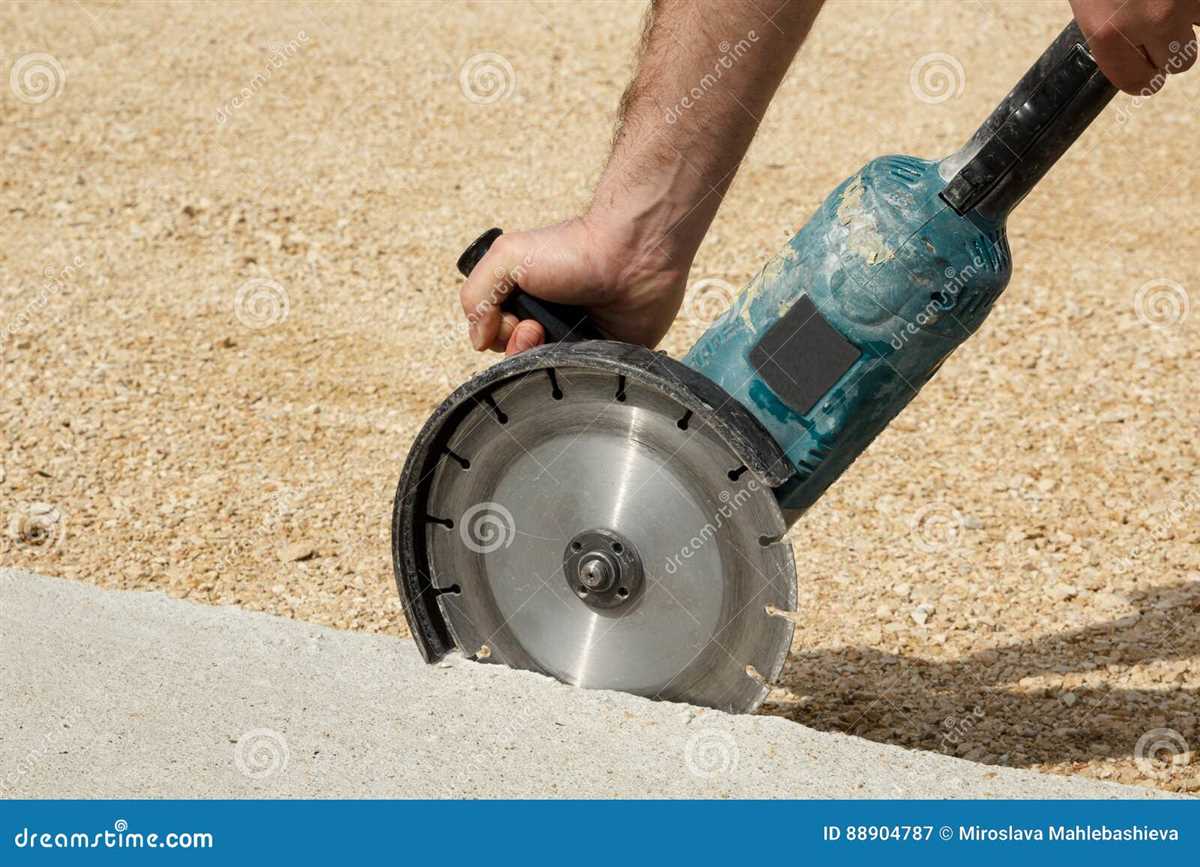
Before you begin cutting the concrete, it is important to accurately measure and mark the area that needs to be cut. This will help ensure that you make precise cuts and avoid any mistakes. Some measuring tools that you may need include a tape measure, a pencil or marker for marking the concrete, and a straightedge or a level to help guide your cuts.
Other Tools and Supplies
In addition to the essential equipment mentioned above, there are a few other tools and supplies that you may find helpful when cutting concrete with an angle grinder. These include a water source or a hose for wet cutting to reduce dust, a sturdy workbench or sawhorses to support the concrete, and clamps to secure the concrete in place. Additionally, having a broom or a vacuum cleaner on hand will make it easier to clean up any dust or debris that is created during the cutting process.
Safety Precautions
Cutting concrete with an angle grinder can be a potentially dangerous task if proper safety precautions are not taken. Here are some important safety measures to keep in mind:
- Wear Protective Gear: Ensure that you are wearing the right safety equipment, including safety goggles, a dust mask, ear protection, and work gloves. This will protect you from potential flying debris, dust particles, and loud noise.
- Check the Grinder: Before starting any cutting operation, inspect the angle grinder for any damage or defects. Check the power cord, switch, disc guard, and disc itself. Make sure everything is in proper working condition.
- Secure the Workpiece: Make sure the concrete you are cutting is properly secured. Use clamps or a vice to hold the workpiece in place. This will prevent any unexpected movement or slipping, reducing the risk of accidents.
- Choose the Right Disc: Select a diamond blade or a carbide-tipped blade specifically designed for cutting concrete. Using the wrong type of disc can cause the grinder to kick back or even break, leading to potential injury.
- Start Slowly: Begin cutting at a slow speed and gradually increase it as you gain more control and confidence. Sudden jerking or excessive force can cause the grinder to kick back, so it’s important to maintain a steady and controlled motion.
- Use a Guide: If possible, use a guide or template to ensure accurate cuts. This will help you maintain a straight line and prevent any accidental slips or misalignment.
- Maintain a Safe Distance: Keep a safe distance between yourself and the cutting area. Stand to the side and slightly behind the grinder to prevent injuries in case of kickback or flying debris.
- Be Mindful of Dust: Cutting concrete generates a significant amount of dust. To avoid inhaling or ingesting harmful dust particles, work in a well-ventilated area and use a dust collection system or a wet-cutting method.
- Stay Focused: Maintain your concentration and avoid distractions while operating the angle grinder. Accidents can happen in a split second, so it’s crucial to stay focused on the task at hand.
Remember, safety should always be the top priority when working with power tools. By following these safety precautions, you can minimize the risk of accidents and ensure a safe and successful concrete cutting operation with an angle grinder.
Preparing the Work Area
Before you start cutting concrete with an angle grinder, it is important to prepare the work area properly. Taking the time to do this will ensure that the project goes smoothly and safely.
Clear the Area
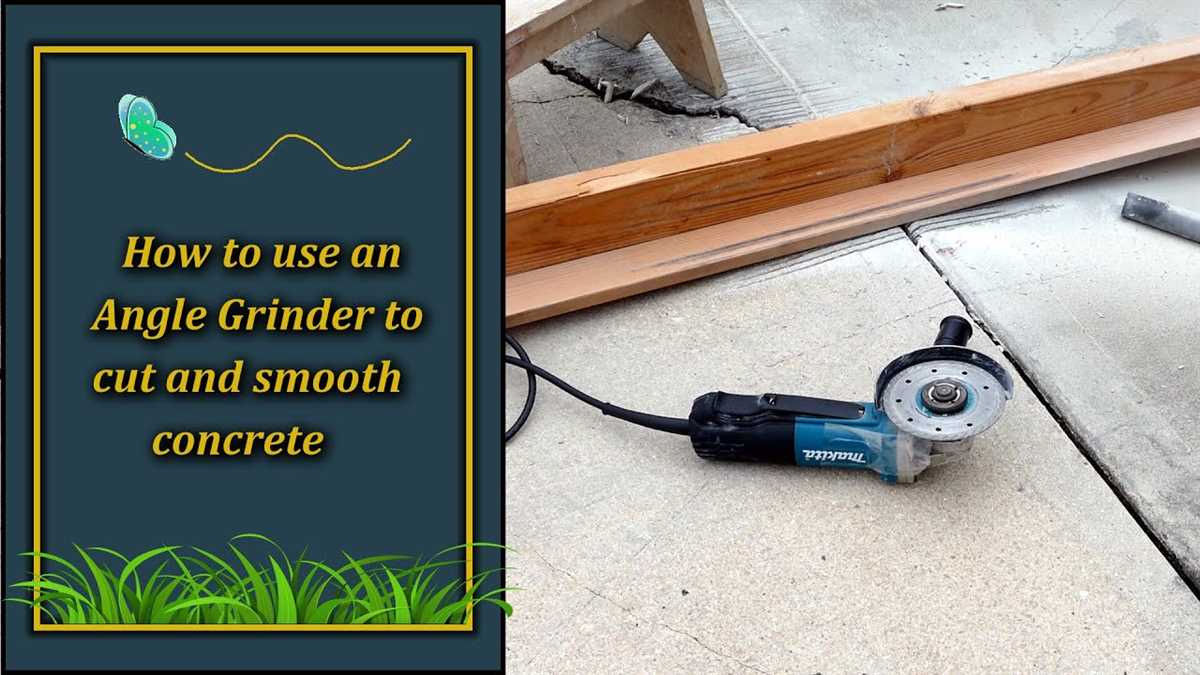
First, clear the area of any debris or obstacles that could interfere with your work. Remove any loose objects, such as rocks or sticks, as they could be kicked up by the angle grinder and cause injury. If there are any large objects that cannot be moved, use caution and work around them.
Set Up Barriers
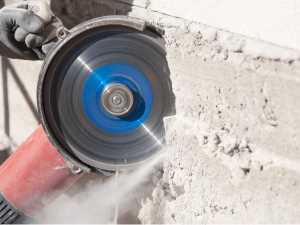
Next, set up barriers or warning signs around the work area to keep others at a safe distance. This will help prevent accidents and ensure that no one unknowingly enters the area while you are cutting concrete. Consider using cones, caution tape, or barricades depending on the size and location of your work area.
Protect Surrounding Surfaces
Concrete cutting can create a lot of dust and debris. To protect nearby surfaces from damage, cover them with plastic sheets or drop cloths. This will prevent dust from settling and potentially causing scratches or stains on floors, walls, or other surfaces.
Wear Personal Protective Equipment (PPE)
Before starting any concrete cutting work, make sure you are wearing the appropriate personal protective equipment (PPE). This includes safety glasses or goggles to protect your eyes from flying debris, a dust mask or respirator to avoid inhaling dust particles, and sturdy work gloves to protect your hands. Additionally, earplugs or earmuffs may be necessary to protect your hearing from the loud noise of the angle grinder.
By taking the time to properly prepare the work area, you will ensure a safe and efficient concrete cutting process. Clearing the area, setting up barriers, protecting surrounding surfaces, and wearing the necessary PPE are all important steps to take before beginning your project.
Marking and Measuring
Before you start cutting concrete with an angle grinder, it’s important to mark and measure the area that needs to be cut. This will help ensure accuracy and precision in your cutting process.
1. Assess the area: Take a careful look at the concrete surface and identify the specific area that needs to be cut. Determine the dimensions of the cut and mark it with a chalk or a pencil.
2. Use a measuring tape: Measure the length and width of the area to be cut using a measuring tape. This will help you determine the exact size of the cut and ensure that it meets your requirements.
3. Use a straightedge: If you need to make a straight line cut, use a straightedge such as a level or a long metal ruler. Place the straightedge on the marked line and draw a clear, straight line using a pencil or chalk.
4. Use a square: If you need to make a perpendicular cut, use a square to ensure that the line is at a 90-degree angle. Place one side of the square against the straightedge and draw a line along the other side of the square.
5. Double-check your measurements: Before proceeding with the cutting process, double-check your measurements to ensure accuracy. Make any necessary adjustments to the markings before you begin cutting.
By taking the time to mark and measure the area accurately, you’ll be able to make precise cuts and achieve the desired result when cutting concrete with an angle grinder.
Making the Cut
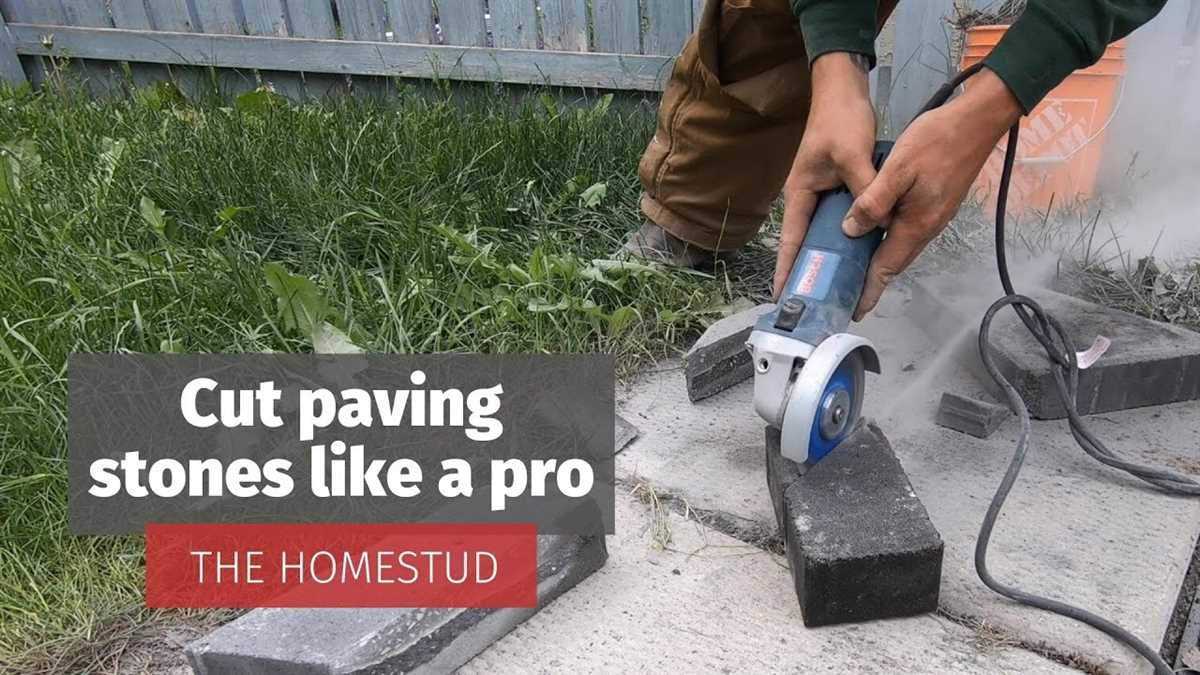
1. Prepare the Work Area
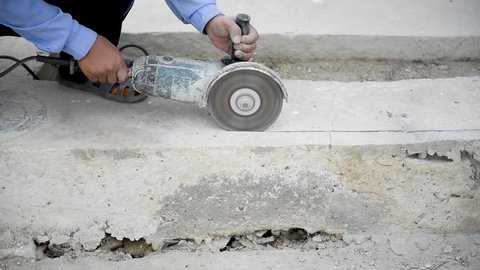
Before you begin cutting concrete with an angle grinder, it is important to prepare the work area. Clear the space of any debris or objects that may obstruct your movement. Ensure that the surrounding area is completely free of any flammable materials. It is also advisable to wear protective gear, such as safety glasses and earplugs, to safeguard against any potential hazards.
2. Mark the Cutting Line
Next, carefully mark the cutting line on the concrete surface using a chalk or crayon. Take measurements and ensure the line is straight and accurate. This will serve as your guide while cutting the concrete with the angle grinder. You may use a ruler or straight edge to achieve a neat and precise line.
3. Set Up your Angle Grinder
Properly set up your angle grinder for cutting concrete. Attach a diamond blade specifically designed for cutting through concrete to the grinder. Make sure it is securely fastened, and double-check that all safety guards are in place. Additionally, ensure that the grinder is fitted with an appropriate power source, such as a grounded electrical outlet or a battery, depending on the type of grinder you are using.
4. Begin the Cutting Process
Now that you have prepared the work area and set up your angle grinder, it’s time to start cutting. Hold the grinder firmly with both hands and position the diamond blade against the marked cutting line. Slowly lower the blade onto the concrete surface, applying light pressure. Begin cutting at a slow and steady pace, allowing the diamond blade to do the work. Remember to maintain a firm grip on the grinder and stay mindful of your surroundings.
5. Make Deep and Controlled Cuts
To ensure a clean and accurate cut, make a series of shallow cuts along the marked line before proceeding to cut deeper. This will help prevent the blade from getting stuck or jumping out of control. As you progress, gradually increase the cutting depth with each pass. Take breaks if necessary to prevent overheating and maintain the blade’s effectiveness.
6. Finishing Touches
Once you have made a clean, deep cut along the entire length of the marked line, you can remove the excess concrete. Use a chisel and hammer to chip away any remaining pieces, or use a grinder with a masonry grinding disc for a smoother finish. Keep in mind that cutting concrete with an angle grinder produces a considerable amount of dust, so it is advisable to have proper ventilation or wear a dust mask for protection.
Remember, cutting concrete with an angle grinder can be a challenging and potentially dangerous task if not done correctly. It is always recommended to consult a professional or seek guidance from an experienced individual if you are unsure or unfamiliar with the process. By following the proper steps and safety precautions, you can achieve precise and satisfactory results in your concrete cutting project.
Removing Excess Concrete
Once you have cut your concrete using an angle grinder, you may find that there is still some excess concrete left behind. This can be due to the nature of the material or uneven cutting. In order to remove the excess concrete and achieve a smooth finish, you can follow these steps:
1. Use a chisel and hammer
If there are small areas of excess concrete, you can use a chisel and hammer to chip away at the material. Start by creating a small groove around the edges of the excess concrete and then carefully chip away at the material in small pieces. Make sure to wear safety goggles and gloves while doing this to protect yourself.
2. Use a concrete grinder
If there are larger areas of excess concrete, it may be more efficient to use a concrete grinder. This tool is specifically designed to remove concrete and can be rented from a hardware store. Attach a diamond grinding wheel to the grinder and slowly move it across the surface of the excess concrete. Make sure to keep the grinder moving to avoid creating uneven spots.
3. Smooth the surface with a trowel
After removing the excess concrete, you can use a trowel to smooth the surface. Apply a thin layer of concrete patching compound to fill in any remaining gaps or uneven areas. Then, use the trowel to smooth and level the surface, ensuring that it is flush with the surrounding concrete. Allow the patching compound to dry according to the manufacturer’s instructions.
By following these steps, you can effectively remove excess concrete and achieve a smooth, professional finish. Remember to always wear protective gear and use caution when working with power tools.
Finishing Touches
Once you have completed cutting the concrete with your angle grinder, there are a few finishing touches you can add to ensure a clean and professional look.
Smooth the edges
After cutting the concrete, the edges may be rough and uneven. To create a smooth finish, use a diamond cup wheel to grind down any rough edges. Start with a coarse grit and gradually work your way up to a finer grit to achieve a polished look.
Clean the area
Concrete cutting can create a lot of dust and debris. It is important to clean the area thoroughly after you are done cutting. Use a broom or a vacuum cleaner to remove any leftover dust and debris. This will not only make the area look cleaner but also prevent any hazardous conditions.
Seal the edges (if necessary)
Depending on the purpose of the concrete, you may need to seal the edges to protect them from moisture and damage. There are various types of sealers available, such as acrylic or epoxy-based sealers. Follow the manufacturer’s instructions to properly apply the sealer and ensure maximum protection for your concrete.
Dispose of waste responsibly
When cutting concrete, you will have leftover pieces and debris. Make sure to dispose of these materials properly according to local regulations. Concrete can be heavy, so consider hiring a professional waste removal service or renting a dumpster to safely dispose of the waste.
By following these finishing touches, you can ensure that your concrete cutting project is not only successful but also visually appealing. Take the time to complete these steps, and you’ll have a clean and professional-looking finished product.
Cleanup and Maintenance
Cleaning up the workspace
Once you have finished cutting the concrete with the angle grinder, it is important to clean up the workspace to ensure safety and maintain the tool’s longevity. Start by removing any dust or debris from the area using a broom or vacuum cleaner. Sweep the floor thoroughly to remove any leftover concrete particles. This will prevent accidents and make the area ready for the next task.
Maintaining the angle grinder
To keep your angle grinder functioning optimally, regular maintenance is necessary. After each use, disconnect the power and allow the tool to cool down. Using a brush or compressed air, remove any accumulated dust or debris from the tool’s surface and vents. Inspect the grinding wheel for any signs of damage or wear and replace it if necessary. Additionally, check the power cord and plug for any fraying or damage.
Protective gear and disposal
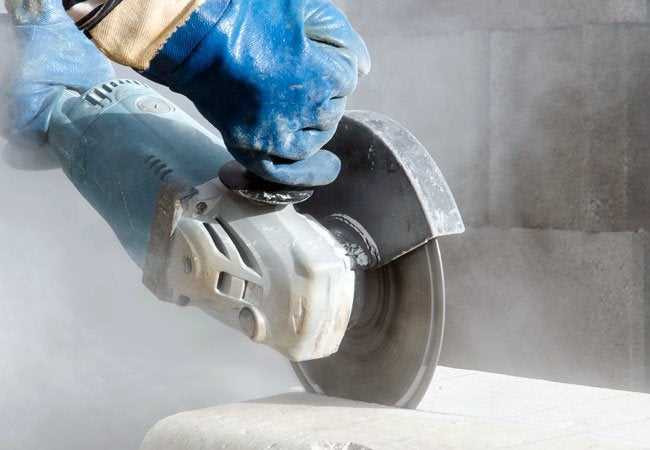
Always wear appropriate protective gear, such as safety goggles, gloves, and a dust mask, when cutting concrete with an angle grinder. This will protect you from flying debris and harmful dust particles. It is also important to dispose of any leftover concrete or cutting residue properly. Consult local regulations and guidelines for proper disposal methods.
FAQ:
What safety precautions should I take when cutting concrete with an angle grinder?
When cutting concrete with an angle grinder, it’s important to wear safety goggles, a dust mask, and ear protection. Additionally, make sure to wear thick gloves and long sleeves to protect your hands and arms from debris. Always work in a well-ventilated area to avoid inhaling dust particles.
What type of angle grinder should I use for cutting concrete?
When cutting concrete, it’s best to use a high-powered angle grinder with a diamond blade. A 7-inch grinder with a diamond blade is commonly used for cutting through thick concrete slabs or blocks. However, for thinner concrete, a smaller angle grinder with a diamond turbo blade can also be used.
Do I need to wet the concrete when cutting with an angle grinder?
Wetting the concrete can help reduce dust levels and prevent overheating of the blade. If you’re planning to cut a large amount of concrete, it’s recommended to use a constant water supply to cool down the blade and suppress dust. However, for smaller cuts, you can simply wet the surface of the concrete with a hose or spray bottle.
Can I use a regular cutting disc on my angle grinder to cut concrete?
No, a regular cutting disc is not suitable for cutting concrete. Concrete is a dense and tough material, so it requires a special diamond blade designed for cutting through concrete. Using a regular cutting disc on concrete may cause the disc to overheat or wear out quickly, leading to inefficient cutting and potential safety hazards.
What is the best technique for cutting concrete with an angle grinder?
When cutting concrete with an angle grinder, it’s best to use a constant and smooth motion. Start by marking the desired cut line on the concrete surface, then slowly and steadily guide the angle grinder along the marked line. Apply light pressure and let the weight of the grinder do most of the work. Avoid rushing or forcing the grinder into the concrete, as this can lead to uneven cuts or damage to the blade.
Are there any alternative methods to cutting concrete without an angle grinder?
Yes, there are alternative methods to cutting concrete if you don’t have access to an angle grinder. You can use a circular saw with a diamond blade or a wet saw specifically designed for cutting concrete. Additionally, if the concrete is not too thick, you can use a chisel and a hammer to create a groove along the desired cut line, then apply force to break the concrete along the groove.
Video:











